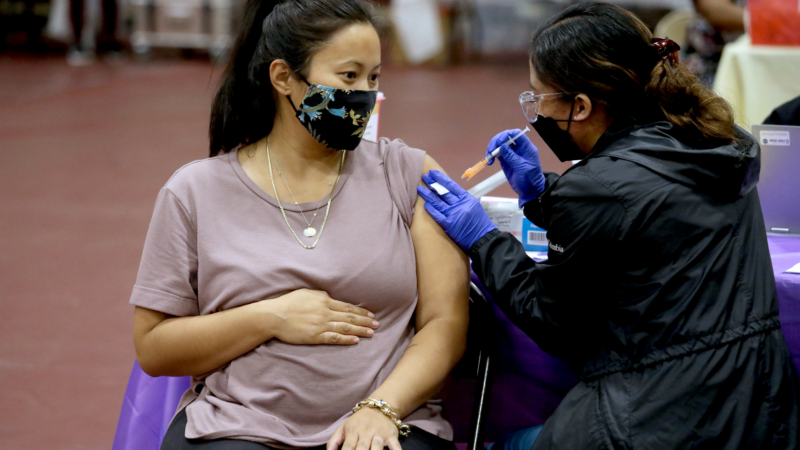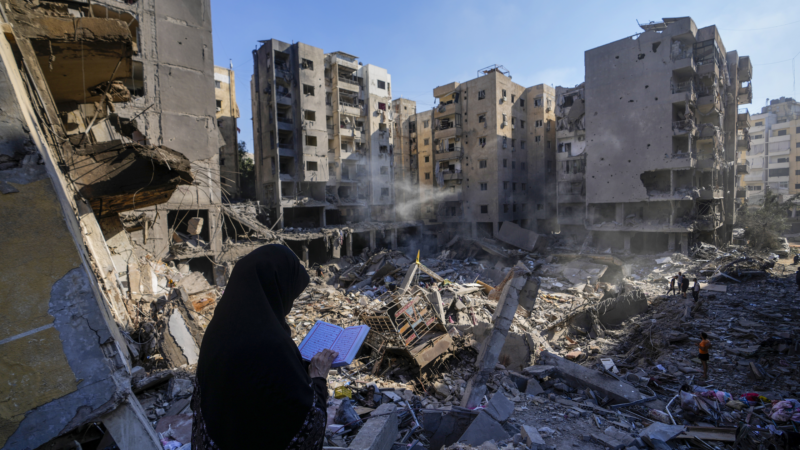Getting the COVID vaccine during pregnancy protects newborns from hospitalization
Nearly 90% of babies who had to be hospitalized for COVID-19 had mothers who didn’t get the vaccine during pregnancy, according to new data from the Centers for Disease Control and Prevention.
Babies too young to be vaccinated had the highest COVID hospitalization rate of any age group except people over 75.
Infants can’t get vaccinated against COVID until they are at least six months old. That leaves a “huge window” when infants are most vulnerable, said Dr. Neil Silverman, director of the Infectious Disease in Pregnancy program at the David Geffen School of Medicine at UCLA.
The only effective protection for babies during those six months comes from vaccinating pregnant women, so they pass the antibodies on to their newborns. Vaccination during pregnancy also protects pregnant people from contracting severe disease.
The study underscores the critical importance of vaccinating pregnant people. It also echoes what physicians have anecdotally reported for more than three years – people are still skeptical of COVID vaccines due to persistent misinformation.
The study drew upon medical data in 12 states, collected between October 2022 and April 2024. The findings appear in the agency publication Morbidity and Mortality Weekly Report (MMWR).
Of the 1,470 infants sick enough to be hospitalized due to COVID, severe outcomes occurred “frequently” according to the report.
Excluding newborns hospitalized at birth, about 1 in 5 infants hospitalized with COVID required intensive care, and nearly one in 20 required a ventilator.
“These aren’t necessarily high-risk, ill newborns,” said UCLA’s Silverman. “These are full term, healthy newborn kids who happen to get COVID and wind up on a ventilator in the hospital.”
Many pregnant patients are still hesitant, despite the risks
But persistent vaccine misinformation online has led to skepticism among his pregnant patients.
“The most frustrating response that I get from folks is that they need to do more research before they think about getting the COVID vaccine,” Silverman said. “We have dozens and dozens of studies showing the safety of the MRNA vaccine. I don’t know how much more research we can provide to skeptics.”
Among the 1,000 babies hospitalized with COVID, the median age was just 2 months old, according to the report. Nine of the infants died.
South Carolina pediatrician Deborah Greenhouse said she plans to share the study with families she cares for. “There absolutely is a proportion of the population who will look at this and say, wow, I should get that vaccine. It could protect my baby,” she said.
“I think that it might help to convince some parents when you can actually show them hospitalization numbers, and you can show them intensive care numbers, and you can show them mechanical ventilation numbers, those things are a big deal,” Greenhouse said.
Doctors should stock the shots, and talk about it
Often, Greenhouse waits to confirm that a parent in our office is pregnant, before discussing the updated COVID shot. Now she’s rethinking that strategy, and may try talking about vaccination with all parents, when they bring their kids to appointments.
“We have an opportunity to intervene and to do some education and make them understand how important this is,” she said.
Physicians can encourage vaccination by making it as easy and simple as possible, Silverman said. He encouraged fellow doctors to offer the shots in their offices, rather than sending patients out to pharmacies or other health care providers.
“We lose probably 30 to 40% of vaccination opportunities once someone has to leave the office to get a vaccine,” Silverman said.
But offering COVID shots in their clinics may force some doctors to undertake a difficult calculation.
If doctors overestimate how many patients will be interested in the vaccine, they may not be able to return all their excess doses, and could lose money. On the other hand, they want enough doses on hand to vaccinate all the vulnerable patients who want the shot.
This article comes from NPR’s health reporting partnership with KFF Health News.
IDF prepares to invade southern Lebanon as 2 more Hezbollah leaders are presumed dead
At least 11 people were killed in the latest Israeli airstrikes, according to Lebanon’s National News Agency. The Israeli military, meanwhile, says it’s preparing for a ground invasion into southern Lebanon.
Coal miner dies at Alabama mine with dozens of recent safety citations
In the past week, the mine was cited for not having proper roof and mine support. The fatality follows a leadership change at the company and a federal lawsuit alleging that leaking methane blew up a home above the mine in March.
Should you vote your feelings? A traveling play helps audiences think that through
An acclaimed Edinburgh Fringe show encourages the audience to think about why they're voting the way they do.
Why the U.S. government is hailing Israel’s killing of Hezbollah’s leader as ‘justice’
Hezbollah’s leader Hassan Nasrallah was killed by Israeli airstrike this weekend. The Biden administration said it gives the victims of the Iran-backed Lebanese militant group "a measure of justice."
If you want to stress less, join NPR’s quest to reclaim your calm
Life can be stressful, and how you manage it is key. We have science-backed tips to help you cope. Get five weekly newsletters and a master class in stress management: Join us.
Terry Crews shares the advice his mom gave him that he carries to this day
Terry Crews went to college on an art scholarship, played football in the NFL and now stars in movies and hosts America's Got Talent. The key, he says, is to be really good at failure.








